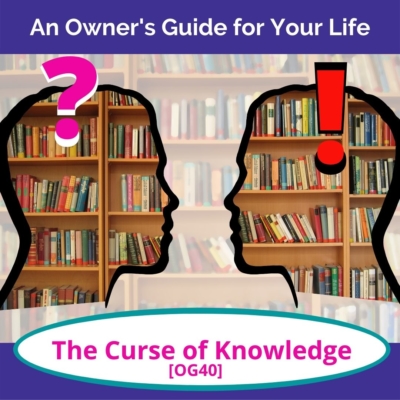The Curse of Knowledge
Music / Intro:
Welcome to An Owner’s Guide for Your Life, the podcast that combines psychology, coaching, common sense and fun. I’m Tracey Browning, an entrepreneur, life coach and lover of people. Now let’s talk about how to live, love, make money and change the world.
Tracey:
Hey, I’m glad you’re here.
Ive had this idea pop up in front of me in my regular day to day life. It’s popped up in a couple of different places and whenever something like that happens, I take it as a sign that it’s probably a good thing to talk about.
So this idea is called the curse of knowledge. Have you ever heard of it? It’s a term that came about back in the early 90’s really. What it means is that you assume others have the same information, the same understanding about something that you have. You forget what it’s like to not know something.
Kinda like when you see one of those horrific images and you say, “I can’t unsee that!” You’re right, you can’t, you’ve seen it already. So why does this matter?
Well, if you understand that you have, and I’m doing the air quote thing, “the curse of knowledge”, it can help you communicate things better. It can help you have a little more empathy for other people.
I’m going to give you a couple of scenarios where it’s popped up for me and why this is a thing.
I’m a psychology professor. I’m an adjunct professor at a university and one of the things that happens is that I don’t do this all the time. It’s not part of my regular day to day life so things like, even though I’m pretty proficient in technology because I’ve done digital marketing for years now, but that doesn’t mean I know all the technology. It doesn’t mean I know all the hardware and all the software and all the things that need to be done so at the beginning of class, when my class first started, there were some technicological things that I didn’t know how to do and it was playing out in front of my students that I didn’t know how to hook this computer up to this screen and what all these different things took. Now honestly this went on for a little while. You know how technology is- things pop up. Sometimes computers really do have a mind of their own.
But I felt it was important to be transparent that I didn’t know how to do these things. On one hand, my first reaction was I felt a little bit stupid that I didn’t know it. And I had to remind myself, “How could you know this? You’ve never worked with this particular computer screen interface. It’s ok. You’re not supposed to know it.” So when somebody else comes in and they’ve done it before, many times, and it looks super easy for them….the curse of knowledge. It looks like we SHOULD know, there’s that word should again. I thought it was an important thing to model for my students but also to remind myself that it’s ok not to know. Even though some of the other folks weren’t remembering that everybody doesn’t have the same knowledge base. It’s ok not to know. Good grief, with all the different kinds of hardware and software and technology and new phones and new equipment and all the things we’ve got around us- understanding the curse of knowledge can be an important thing, right?
Here’s another area where I was reminded of the curse of knowledge. I play an online game. I’ve played it for over a year now. I play it as entertainment, as stress relief. It’s called Forge of Empires. If you happen to know it, you can build these little cities and buildings and obviously from my description, I’m entertained by being able to put together and reorganize the towns and do these little projects. Now, Forge of Empires. There’s a war component, there’s a battle component- well, I wasn’t in it for the battle. Yeah, there’s soldiers and different kinds of things like that but I wasn’t in it for that. I was just kind of playing by myself, doing my own thing and what wound up happening was that you can join, they call them guilds in the game. You can join groups and you’re stronger together. It’s just like how empires were built. How things happened over history. People banded together, they were stronger together. But here I was doing my own thing. Well, in the game, I wasn’t even paying attention to battles and soldiers and working together to be stronger together. And, yeah, I joined a guild then I got kicked out and I never knew why. Then I joined another guild. I got kicked out of there too. I still didn’t know why. It took me a while because I wasn’t paying that much attention but finally what I figured out, and I just happened to stumble across it, was that there’s this whole different area of the game where the guild members are talking to each other. And they’d talk to me and I’d never answer. And they’d ask me to do something and I’d never do it. And it wasn’t because I meant to really mess their game up. I didn’t know where to access the messages. So here they’re thinking, good golly, she’s really rude or I don’t know what they were thinking but I didn’t have the knowledge they had about where to go in the game to talk to them. I’ve since figured it out, I’m not an expert but I’m getting better and I still enjoy playing my game.
Now other places you see this. Every store that you go to check out at, every single credit card machine is different. I have yet to come across one that you swipe your card, you sign, you check yes/no/I want this kind of receipt. It’s not the same. The folks running the registers there, that’s the one they see all the time so they think it’s super apparent what you’re supposed to do. But it’s not always. The curse of knowledge.
There’s a study that if you look up ‘curse of knowledge’ this is the study that you’ll see that was done in ‘89 or ‘90 called the tapping study. People were either tappers or listeners. And before you tapped or listened, the researchers asked the tappers to predict how often a listener could accurately predict the tune they were tapping. They had a sheet of 35 or 40 well known tunes to choose from. So the soon-to-be tapper predicted on average 50% of the time the people listening to this should be able to guess what tune I’m tapping. So try this. I’m going to tap something for you.
[sounds of tapping]
Do you know what I’m tapping? Maybe you do, maybe you don’t. If I give you a clue that today is actually my mother’s birthday and I did that in honor of her birthday, could you guess?
I know exactly what I’m doing because I’m singing along… [sings and taps Happy Birthday to you]
Now that you know, of course you can guess that it’s Happy Birthday but if all you heard was the tapping, you wouldn’t know. You don’t have the knowledge I have and we tend to overestimate because we forget people don’t know all that we know about it.
Now in that study, the actual average rate of people being able to guess what was being tapped was 2.5%.
Try this…[taps another tune]
I’m not gonna tell you what that is. Just see if you can guess it.
But this is why hindsight is 20-20. Because now we KNOW the information, we know how it played out but it’s easy to forget that we didn’t know all that before.
And you know if you’ve ever worked in an industry where there’s a lot of jargon and acronyms, ooh, you feel this curse of knowledge for sure. Because when you’re enmeshed in this industry you forget that not everybody knows what you’re talking about. So when you’re going, “Does a CEO need to know SEO or is that more of a CTO or even an IT kind of thing?” Maybe you understood what I was talking about, it’s really not that hard, I know exactly what I meant.
The curse of knowledge.
We forget.
I tend to be a little more sensitive to this because it relates to me, when I think about over my life, all the different times I moved and when I was the new person in the group, in the area, in the school, on the job. People had information that I didn’t have and they would forget that I didn’t know everything they knew.
So what difference does this make to you in real life? Other than that you probably run into this an awful lot and now you’ve got a name for it, right? The curse of knowledge.
When you understand that this is one of these cognitive biases that’s in effect, maybe it helps you to slow down and communicate very clearly. This is one of the reasons why an expert doesn’t necessarily make the best teacher. We’ve all know people who really, really know their subject matter but they can’t teach for beans. It’s because they forget what it’s like to not have that information, to not understand how these things work. So when you understand it, you can slow down, you can communicate clearly.
Maybe it helps you to remember not to assume things. When I’m dealing with people, I like to tell myself I’m just going to go with the idea that they just don’t know rather than they’ve got some ill intention towards me. Like in my video game playing. Boy, I hope those people who kicked me out of their guilds know I really didn’t mean to be ugly and not a team player.
But understanding the curse of knowledge too, maybe it can help you have a little more empathy for the people you’re talking with. And for yourself. Give yourself some grace.
It’s ok to not know.
We’re not walking encyclopedias, at least most of us aren’t.
I’m not, for sure. We can’t know everything.
That’s why I decided to be very transparent about it in my psychology class. I was a real life example of it’s ok to not know everything. We can’t, it’s impossible.
So as you go through your day, pay attention to where’s the curse of knowledge in effect?
Slow down your communication.
Have a little empathy, for yourself and others.
Now, let’s go live, love, make some money and change the world.
For a transcript of this episode or for more information about life and mindset coaching, visit my website https://www.tbrowning.com/.


![Your Best December Ever [OG39] 2 Your Best December Ever](https://www.tbrowning.com/wp-content/uploads/2021/12/best-december-e1638791418771.jpg)
![Thoughts on a Hole [OG38] 3 Thoughts on a Hole](https://www.tbrowning.com/wp-content/uploads/2021/12/hole-e1638451588290.jpg)


